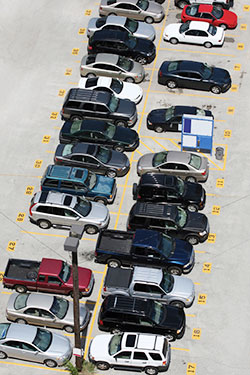Non-Toll Pricing—A PrimerMaking Non-Toll Pricing HappenIndividual and Corporate ActionsEmployers have the ability to implement parking cash-out now, along with complementary incentives, such as subsidized transit for employee commuting. Doing so helps establish an employer as a good corporate citizen that contributes to community clean-air and traffic-reduction goals and helps with employee recruitment and retention. A good resource for employers looking to implement parking cash-out and complementary measures is the Best Workplaces for Commuters Program (http://www.bestworkplaces.org ), originally launched by the U.S. Environmental Protection Agency and DOT and currently run by the University of South Florida’s Center for Urban Transportation Research. Employees can encourage and work with their employers to establish programs that provide parking cash-out and transit benefits. Individuals may consider signing up for car sharing if it is available in the area where they live. If after a short test period they find that car sharing works for them, they could then sell a household vehicle and increase their reliance on car sharing and alternative transportation modes. Individuals may also seek out companies that offer PAYDAYS car insurance or encourage their own car insurance company to offer such an option. Government IncentivesSome forms of PAYDAYS and variable parking pricing are advancing strongly on their own, whereas others could use a boost, perhaps from governmental incentives. For example, car sharing is growing very rapidly in U.S. cities on its own, whereas PAYDAYS insurance, at least where the premium is based mostly on usage, is not available to most consumers and probably will not be for some time without strong governmental incentives. King County, WA, which encompasses Seattle, WA, has undertaken research and has engaged in extensive outreach to insurance companies. This includes launching a partnership with Unigard Insurance Group to pilot PAYDAYS insurance, with support from the Federal Value Pricing Pilot Program. The North Central Texas Council of Governments, covering the Dallas–Fort Worth area, has also aggressively sought insurance company partners. It made around $2 million available for this purpose because of the potential of PAYDAYS insurance to reduce driving and in an effort to begin to reverse a severe regional air pollution problem. In recognition of the benefits, and also the challenges, that the industry faces in offering PAYDAYS insurance, the State of Oregon enacted tax credits, capped at $1 million, for policies that are at least 70 percent variable and that cover all household vehicles. Eligible policies earn a $100 per-vehicle credit, up to $300 per household. These tax credits have spurred many conversations with insurance companies about offering PAYDAYS insurance in Oregon. No company has yet established an eligible program there, largely because the total credits offered are small relative to the expected transition costs and risks companies would face. Still, the Oregon approach of providing incentives to introduce PAYDAYS insurance is one that garnered substantial support and might ultimately achieve its desired result.  The Brookings Institution has recommended a Federal tax credit of $100 for each new mileage-based policy that an insurance company writes, phased out after the first five million vehicles are covered this way. As Oregon has demonstrated, states could also enact their own tax credits. Brookings also recommended dedicating $15 million in the next Federal surface transportation reauthorization bill exclusively to support PAYDAYS insurance pilots (Bordoff & Noel, 2008). Parking cash-out is mandated by law for some large California employers whose circumstances allow them to recover the cost of offering the benefit by shedding parking. Some states provide tax credits and other incentives to employers that offer transportation commute benefits, including parking cash-out. Maryland provides the most generous incentives of any state, offering employers a 50-percent tax credit (extended also to non-profits), up to $30 per employee per month, for the cost of these benefits, including for a parking cash-out payment. Other incentive approaches may also be used. For example, states could set aside a portion of their Federally apportioned Congestion Mitigation and Air Quality Improvement (CMAQ) Program funds to support PAYDAYS and variable parking pricing pilots. A hypothetical incentive policy to promote vehicle-use pricing, which could be established as its own new Federal or state program or through set aside CMAQ Program funding from states, has been shown to be many times more cost effective than the typical CMAQ expenditure of funds by states in reducing transportation emissions (Greenberg, 2002). Regardless of what, if any, incentives are offered, PAYDAYS and variable parking pricing strategies are beginning to garner appreciation for their potential to reduce congestion, while saving consumers money and offering a plethora of other benefits. |
|
United States Department of Transportation - Federal Highway Administration |
||